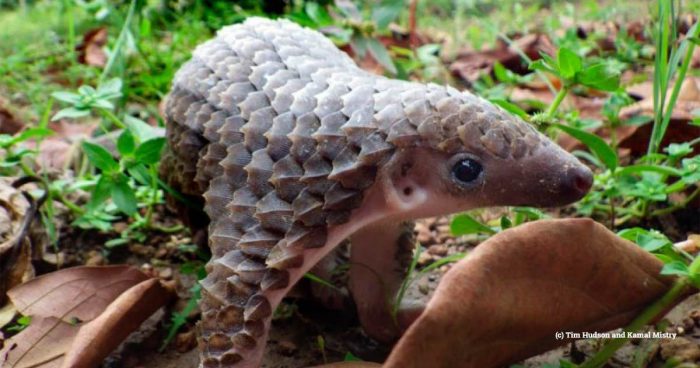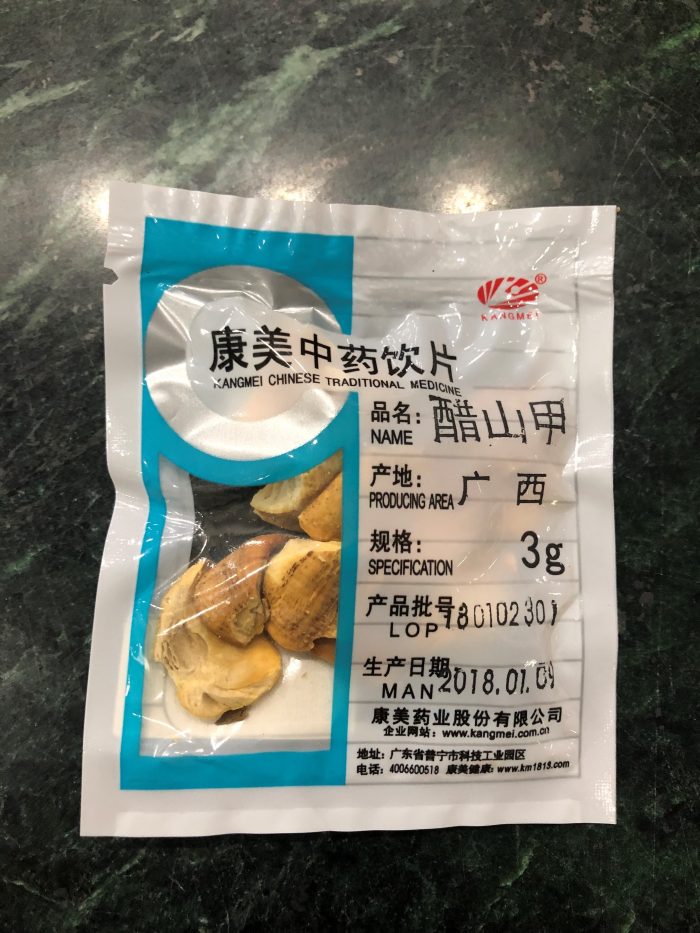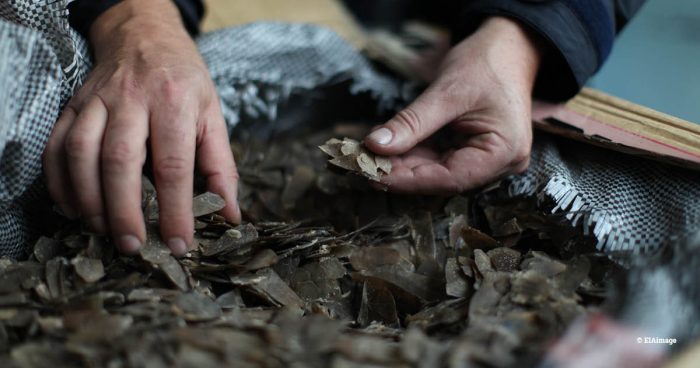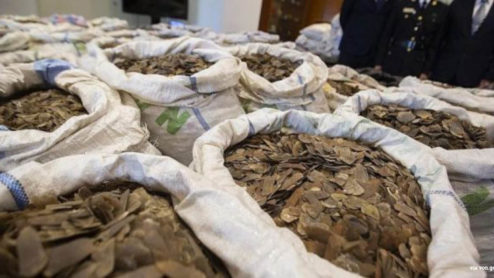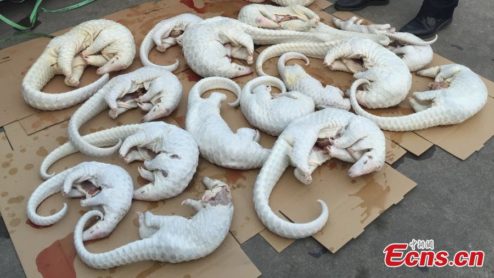China’s widely publicised new pangolin protections might not mean a total ban on use of the species
International media such as the BBC, The Guardian, CNN and many others have this week reported that the Chinese Government has removed pangolin scales as an ingredient from the latest edition of its traditional Chinese medicine (TCM) pharmacopoeia.
However, the story is not as straightforward as that and, while the Government’s action appears to be a step in the right direction, questions remain.
The country’s TCM pharmacopoeia is a compendium of traditional and Western medicines.
While the Government appears to have removed endangered pangolins from a list of key raw TCM ingredients, it is not yet clear whether pangolins have also been removed from a separate section of the pharmacopoeia as an ingredient in approved patent medicines.
Pangolins are the most trafficked mammal in the world and their scales are in high demand for use in TCM.
Despite consumption of pangolin meat being officially banned in China, licensed hospitals and pharmaceutical companies have been permitted to use pangolin scales in traditional medicines – a practice regarded as a major driver in the transnational trafficking of pangolins from across Africa and Asia into China.
If approved patent medicine formulae in the pharmacopoeia containing pangolin have not been removed or amended, it would mean the pharmacopoeia would continue to promote and legitimise medicinal use of pangolins.
This has happened before – neither leopard bone nor bear bile are now included in the ‘key ingredients’ section of the pharmacopoeia, yet are still listed among ingredients for patent medicines and so their legal commercial use continues.
In China, legal trade in medicinal products is not always restricted to ingredients and patent medicines listed in the pharmacopoeia; EIA has documented products in legal trade which list leopard bone as an ingredient and which are not included in the official directory.
These questions need to be clarified and backed up by official policy announcements before we can celebrate a total ban on China’s domestic trade in pangolins.
However, the move is being interpreted as an acknowledgement from China of the need to address the use of pangolin scales in TCM to protect pangolins in the wild.
The Government has also recently increased the formal domestic protection of its three native pangolin species – Chinese, Sunda and Indian pangolins – from second class to first class special state protection, the highest form of protection under national legislation.
This uplisting does not automatically mean that domestic trade in these species is completely prohibited since exemptions allowing their use in TCM could still apply.
As per existing Chinese Government notices, the other five non-native Asian and African species should already be treated as first class special state protection since they are on Appendix I of the Convention on International Trade in Endangered Species of Wild Fauna and Flora (CITES).
The uplisting does mean that penalties for wildlife crime involving China’s native pangolins could increase. Obtaining a legal license to collect wild pangolins could also become more difficult since it would require the approval of the central wildlife conservation department (i.e. the National Forestry and Grasslands Administration) instead of provincial forestry departments.
Chris Hamley, EIA Senior Pangolin Campaigner, said: “The latest news from China on the strengthening of domestic pangolin protections is a positive result in the ongoing global effort to end the trafficking of pangolin scales.
“However, EIA would like to see these latest moves backed up by further action and official announcements to ensure that Government permits will no longer be issued for the production and sale of medicines containing pangolin scales and that existing pangolin scale stockpiles will be destroyed.”
EIA remains concerned that other threatened species are still being legally used by companies to make TCM products, such as leopards whose bones are used to make pills and wine.
Aron White, Wildlife Campaigner & China Specialist, added: “It is disappointing that authorities have not taken this opportunity to also unequivocally end official promotion of the use of leopard bone in TCM – the reasons for removing pangolins from the state pharmacopoeia apply to leopards as well.”
英国广播公司(BBC)、英国《卫报》(The Guardian)及美国有线电视新闻网(CNN)等媒体于上周广泛报导,指中国政府已将穿山甲片从最新出版的《中国药典》中除名。
虽然表面上中国政府的决定对保育穿山甲前进了一大步,但事实并非如此简单,许多问题仍然急需正视。
《中国药典》是国家的药用全书,收录了传统中药以及其他西药的纲要。
虽然穿山甲在药典的原材料部份已被移除,可是牠们仍可能在专利药方的成分中继续被入药。 穿山甲是全球走私量最大的哺乳动物,牠们的甲片在内地中药市场有庞大需求。
中国早已禁止食用穿山甲肉, 但甲片的贸易和使用却获得豁免。目前多家医院和制药公司仍在使用和生产含有穿山甲片的中成药。然而药用价值被认为是穿山甲片从非洲和亚洲跨国贩运到中国的主要驱动力因素之一。
若药典中含有穿山甲的中成药方尚未删除或修改,这意味着药用穿山甲片将继续受到推广和合法化。
这种漏洞先例可循 — 虽然中药药典的原材料部分中没有包括豹骨和熊胆,但仍被列为中成药物的成分之一,因此它们的合法商业用途仍然存在。
而且,可合法买卖的药品不局限于药典列出的原材料和中成药。 环境调查署在合法中药市场中记录了多项含有豹骨成分的产品,然而这些产品亦没有收录在官方药典中。
我们必需先澄清以上疑问,并以政府公告为据,才可在确认宣布穿山甲已被全面禁止贸易和使用。
总括而言,新措施反映了官方立场:若要保育野生穿山甲,药用甲片的问题亦要正视。
近期来中国政府已将穿山甲由国家二级保护野生动物提升至一级,使在中国自然分布的中华穿山甲、马来穿山甲和印度穿山甲都能得到国家最严格的保护。
但这并不代表穿山甲的买卖已被完全禁止。 即使野生物种已受到一级国家保护,但仍可以医药用途为由获得豁免。
而其他分布在亚洲和非洲的五个非本土的穿山甲品种,均属《濒危野生动植物种国际贸易公约》(CITES)附录一列明物种,因此根据早年的中国政府通告,在境内亦获得相等于一级重点国家保护物种的保护 。
惩处方面,非法猎捕和贸易国家重点保护物种的刑罚应相应增加。 而且申请特许猎捕证的审批权限将更严格,从省级上升到国务院主管部门(即国家林业和草原管理局)。
环境调查署穿山甲项目主任Chris Hamley表示:”中国加强对穿山甲的保护标志着全球打击走私穿山甲片的决心和成果。
但是,环境调查署希望这些消息可获得政府以公告确认和行动支持,确保不再颁发许可证,停止生产和销售药用甲片或含有穿山甲的成药,并销毁现有穿山甲片库存。 」
环境调查署深表关注对于仍被药制公司合法地生产入药的受威胁物种,如豹骨被制成药丸和药酒之问题。 野生动植物项目主任和中国专家Aron White补充说:「令人遗憾的是,即使豹符合了所有穿山甲从药典中被删除的条件,中国当局却没有利用这次机会明确地终止豹骨 在中药的使用和推广。 」


